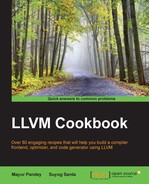Printing an assembly instruction is an important step in generating target code. Various classes are defined that work as a gateway to the streamers. The instruction string is provided by the .td file defined earlier.
The first and foremost step for printing instructions is to define the instruction string in the .td file, which was done in the Defining the instruction set recipe.
Perform the following steps:
- Create a new folder called
InstPrinterinside theTOYfolder:$ cd lib/Target/TOY $ mkdir InstPrinter
- In a new file, called
TOYInstrFormats.td, define theAsmStringvariable:class InstTOY<dag outs, dag ins, string asmstr, list<dag> pattern> : Instruction { field bits<32> Inst; let Namespace = "TOY"; dag OutOperandList = outs; dag InOperandList = ins; let AsmString = asmstr; let Pattern = pattern; let Size = 4; } - Create a new file called
TOYInstPrinter.cpp, and define theprintOperandfunction, as follows:void TOYInstPrinter::printOperand(const MCInst *MI, unsigned OpNo, raw_ostream &O) { const MCOperand &Op = MI->getOperand(OpNo); if (Op.isReg()) { printRegName(O, Op.getReg()); return; } if (Op.isImm()) { O << "#" << Op.getImm(); return; } assert(Op.isExpr() && "unknown operand kind in printOperand"); printExpr(Op.getExpr(), O); } - Also, define a function to print the register names:
void TOYInstPrinter::printRegName(raw_ostream &OS, unsigned RegNo) const { OS << StringRef(getRegisterName(RegNo)).lower(); } - Define a function to print the instruction:
void TOYInstPrinter::printInst(const MCInst *MI, raw_ostream &O,StringRef Annot) { printInstruction(MI, O); printAnnotation(O, Annot); } - It also requires
MCASMinfoto be specified to print the instruction. This can be done by defining theTOYMCAsmInfo.handTOYMCAsmInfo.cppfiles.The
TOYMCAsmInfo.hfile can be defined as follows:#ifndef TOYTARGETASMINFO_H #define TOYTARGETASMINFO_H #include "llvm/MC/MCAsmInfoELF.h" namespace llvm { class StringRef; class Target; class TOYMCAsmInfo : public MCAsmInfoELF { virtual void anchor(); public: explicit TOYMCAsmInfo(StringRef TT); }; } // namespace llvm #endifThe
TOYMCAsmInfo.cppfile can be defined like this:#include "TOYMCAsmInfo.h" #include "llvm/ADT/StringRef.h" using namespace llvm; void TOYMCAsmInfo::anchor() {} TOYMCAsmInfo::TOYMCAsmInfo(StringRef TT) { SupportsDebugInformation = true; Data16bitsDirective = " .short "; Data32bitsDirective = " .long "; Data64bitsDirective = 0; ZeroDirective = " .space "; CommentString = "#"; AscizDirective = ".asciiz"; HiddenVisibilityAttr = MCSA_Invalid; HiddenDeclarationVisibilityAttr = MCSA_Invalid; ProtectedVisibilityAttr = MCSA_Invalid; } - Define the
LLVMBuild.txtfile for the instruction printer:[component_0] type = Library name = TOYAsmPrinter parent = TOY required_libraries = MC Support add_to_library_groups = TOY
- Define
CMakeLists.txt:add_llvm_library(LLVMTOYAsmPrinter TOYInstPrinter.cpp )
When the final compilation takes place, the llc tool—a static compiler—will generate the assembly of the TOY architecture.
For example, the following IR, when given to the llc tool, will generate an assembly as shown:
target datalayout = "e-m:e-p:32:32-i1:8:32-i8:8:32- i16:16:32-i64:32-f64:32-a:0:32-n32"
target triple = "toy"
define i32 @foo(i32 %a, i32 %b) {
%c = add nsw i32 %a, %b
ret i32 %c
}
$ llc foo.ll
.text
.file "foo.ll"
.globl foo
.type foo,@function
foo: # @foo
# BB#0: # %entry
add r0, r0, r1
b lr
.Ltmp0:
.size foo, .Ltmp0-foo..................Content has been hidden....................
You can't read the all page of ebook, please click here login for view all page.
